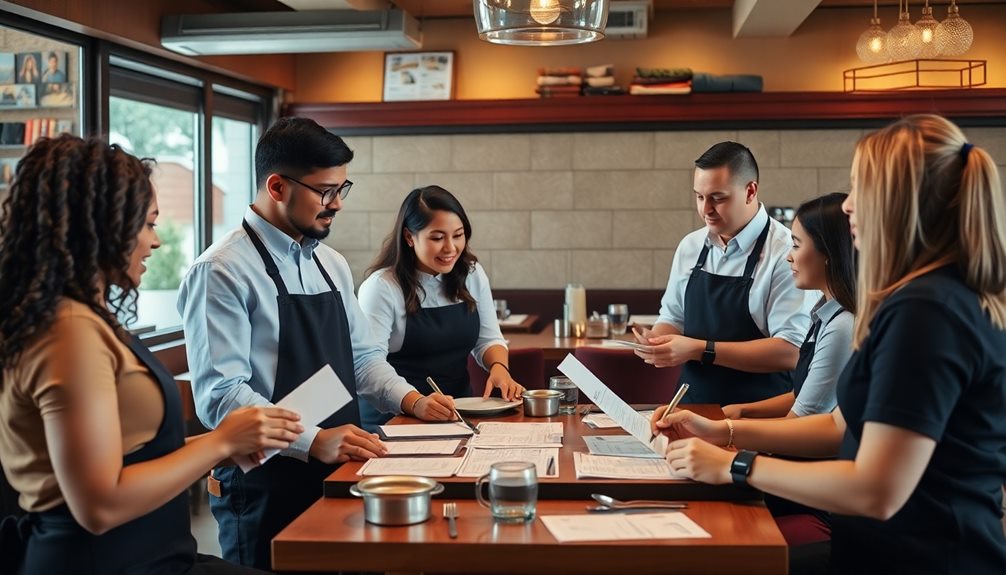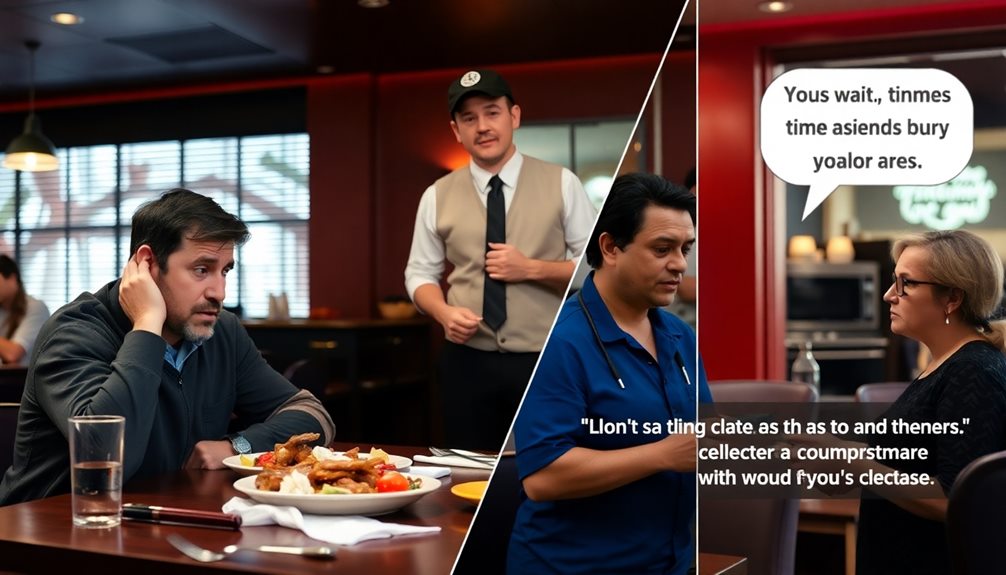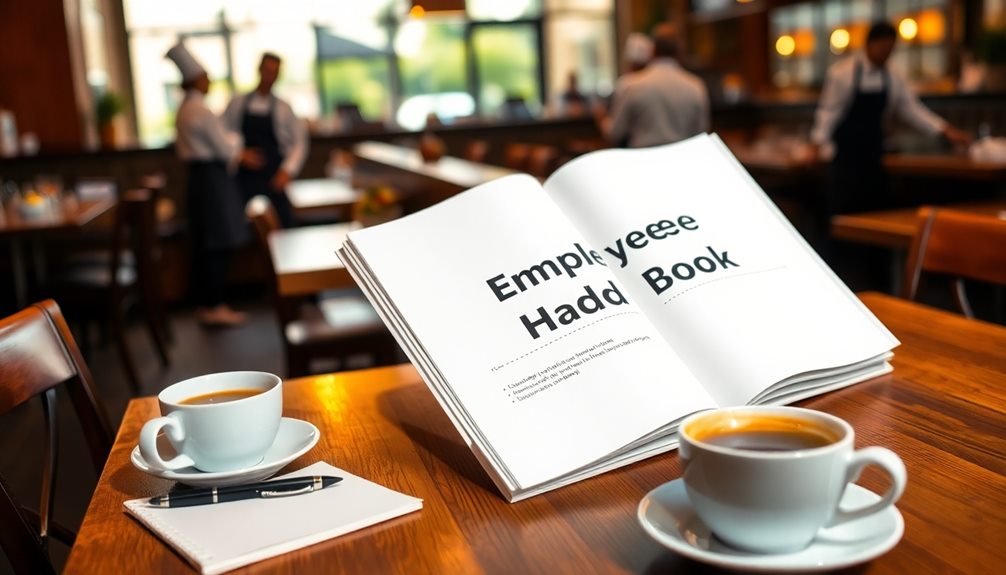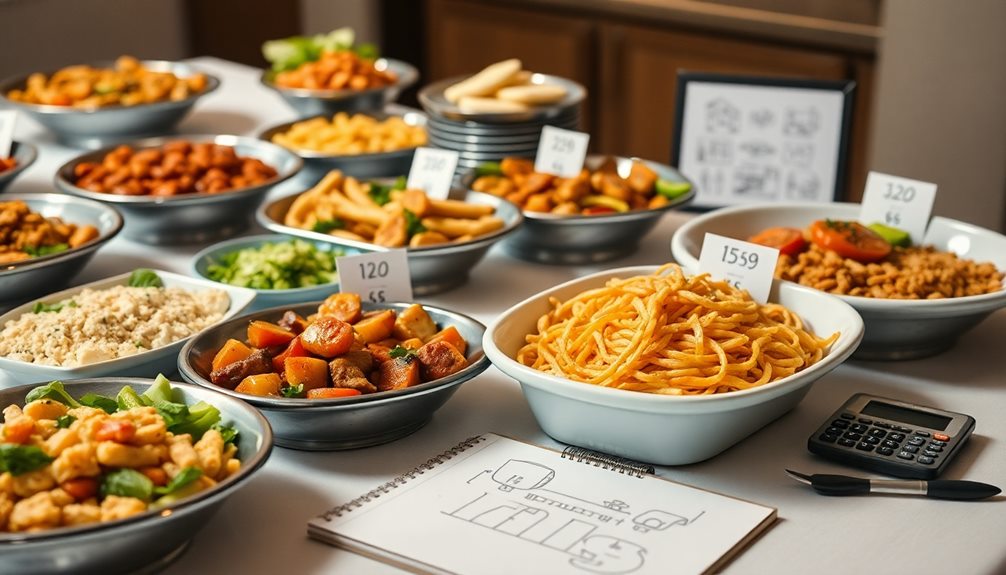To handle customer complaints in restaurants, start by actively listening to the customer. Show empathy and acknowledge their concerns. Train your staff to follow clear protocols for common issues, whether it's food quality or service. Empower them to escalate matters to management if necessary. Respond promptly to online feedback, personalizing your responses to show you care. After resolving complaints, follow up with customers to guarantee they're satisfied. This approach not only helps retain unhappy customers but can also lead to valuable insights for improvement. There's more to explore on enhancing your complaint management strategy.
Key Takeaways
- Actively listen to customer complaints to fully understand their concerns and show empathy towards their experiences.
- Follow established protocols to resolve common issues, ensuring staff are empowered to escalate matters when necessary.
- Monitor and respond to online feedback promptly, providing personalized replies to demonstrate attentiveness and commitment to improvement.
- Conduct regular staff training refreshers to reinforce problem-solving skills and effective complaint management techniques.
- Implement a structured follow-up process to check in with dissatisfied customers and gather insights for operational enhancements.
Importance of Customer Complaints

Customer complaints are vital for any restaurant looking to thrive in a competitive market. These complaints serve as important feedback that helps you identify service gaps and improve the overall guest experience. When you effectively resolve complaints, you're not just addressing the issue at hand; you're also increasing your retention rate.
In fact, studies show that 70% of unhappy customers are willing to return if their complaints are handled well. Additionally, implementing effective strategies for managing customer feedback can lead to operational improvements and a more streamlined service process, much like how creating a retirement savings plan helps in financial stability.
Ignoring these complaints can greatly harm your restaurant's reputation. Dissatisfied customers tend to share their negative feedback with 9-15 people, potentially deterring new clientele. By addressing customer complaints promptly, you can achieve a remarkable 95% retention rate, which underscores the importance of effective complaint management strategies.
Regularly monitoring and analyzing customer complaints allows restaurant managers to track recurring issues, leading to operational improvements and enhanced service quality. Furthermore, acknowledging and resolving complaints fosters loyalty; over 90% of customers who experience a positive resolution are likely to return.
In a landscape where customer service skills are paramount, understanding the importance of customer complaints can set your restaurant apart from the competition.
Effective Staff Training

Effective staff training is fundamental for empowering your team to handle customer complaints with confidence and skill. By equipping your staff with the right tools, you'll guarantee they can respond effectively to customer concerns.
Here are key components of effective staff training:
- Role-playing scenarios to practice empathy and professionalism in real-life situations.
- Active listening techniques that help staff fully understand and engage with customer feedback.
- Clear protocols for resolving common complaints, such as food-related issues or service delays.
- Empowerment to escalate issues to management when necessary, especially in cases of abusive behavior.
- Regular training refreshers to reinforce problem-solving skills and hospitality, turning complaints into opportunities for improvement.
When you prioritize these elements, your team will be better prepared to address customer concerns. They'll feel more confident in their abilities and will view complaints not just as challenges, but as valuable feedback for enhancing customer satisfaction.
Common Complaint Types

Handling complaints effectively starts with understanding the common types that arise in restaurant settings.
One prevalent issue revolves around food quality. Customers often voice dissatisfaction over low-quality ingredients or incorrect orders, which can diminish their dining experience and reduce customer loyalty.
Service-related complaints also frequently occur, particularly regarding rude staff interactions or long wait times. In fact, 91% of dissatisfied customers indicate they wouldn't return after expressing their complaints.
Cleanliness concerns are another critical area; customers expect high hygiene standards, particularly in table sanitation and restroom conditions.
Incorrect billing or mistakes on checks can further erode trust and lead to negative experiences, highlighting the importance of attentive service and accurate order management.
Finally, environmental factors, such as excessive noise levels or poor temperature control, can greatly impact the overall dining experience.
When you recognize these common complaint types, you'll be better equipped to address them swiftly and effectively, ultimately enhancing your restaurant's reputation and fostering customer loyalty.
Responding to Online Feedback

In today's digital age, 78% of consumers trust online reviews as much as personal recommendations, making it essential for restaurants to respond thoughtfully to feedback.
When you encounter online complaints, your approach can greatly impact customer satisfaction and your restaurant's reputation.
Here are some strategies to effectively respond:
- Monitor online reviews regularly to stay informed about customer feedback and identify trends and areas for improvement.
- Customize your responses to address specific issues raised by the customer, avoiding generic replies that may seem insincere.
- Respond promptly to negative feedback; a timely engagement shows attentiveness and a commitment to service recovery.
- Follow up privately with dissatisfied guests when necessary, reinforcing the importance of their feedback and demonstrating your dedication to resolving their concerns.
- Document and analyze complaints to identify recurring issues, allowing you to enhance overall service quality and operational processes.
Follow-Up and Improvement Strategies

Regular follow-ups with customers after addressing their complaints can greatly boost their satisfaction and loyalty. When you take the time to check in, you show that you genuinely care about their experience. Research shows that 70% of unhappy customers are likely to return if their issues are resolved effectively.
Implementing a structured follow-up process not only distinguishes your restaurant from competitors but also fosters a culture of accountability. This approach helps identify recurring issues that can be addressed to improve service quality.
During these interactions, ask for feedback to gain insights into operational improvements and the overall guest experience. Utilizing follow-up communication as a chance to gather additional feedback enhances customer care and informs staff training needs.
Frequently Asked Questions
How to Deal With Restaurant Customer Complaints?
When you face customer complaints, listen actively and empathize with their feelings. Apologize sincerely, tailor solutions to their issues, and follow up afterward. Document trends to improve service quality and prevent future problems.
What Are the 5 Steps to Handling a Customer Complaint?
Imagine a storm brewing; it's your chance to calm the chaos. Listen intently, respond with empathy, offer tailored solutions, go the extra mile, and learn from each complaint to create a smoother sailing experience.
What Are 10 Ways to Handle Customer Complaints?
To handle customer complaints effectively, you should listen actively, apologize sincerely, offer tailored solutions, follow up post-resolution, document feedback, analyze patterns, train staff, maintain transparency, foster communication, and guarantee a positive experience overall.
How Do You Handle Difficult Customers in Restaurant?
When you encounter difficult customers, stay calm and listen actively. Show empathy for their feelings, offer tailored solutions, and follow up to guarantee satisfaction. This approach strengthens relationships and encourages loyalty, turning challenges into opportunities.
Conclusion
Handling customer complaints in your restaurant can transform a bitter experience into a sweet opportunity. Picture a bustling dining room where a dissatisfied guest turns into a loyal patron after you address their concerns with care. By training your staff, responding thoughtfully to online feedback, and implementing follow-up strategies, you create an atmosphere of trust and satisfaction. Embrace complaints as stepping stones, leading you toward a thriving dining experience that keeps customers coming back for more.









